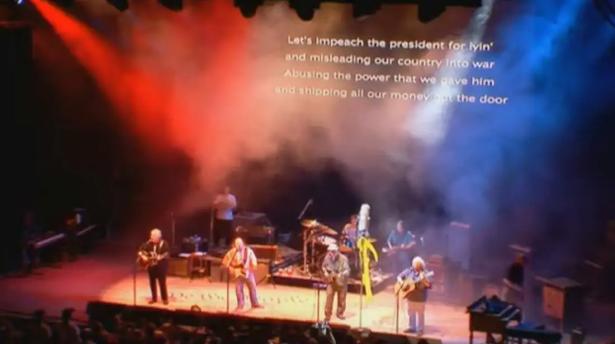I am a very late member of the Baby Boom generation, born in 1962. My first musical tastes involved a membership in the Partridge Family fan club that I shared with my younger sister. But I can date precisely when I woke up to the real music of my youth and of the larger counterculture: it was sitting on a grassy field in 1973 at sleepaway camp, hearing for the first time the thrilling harmonies of Suite: Judy Blue Eyes played over the PA system and wondering, who the hell was that? From that moment forward, I became a fan of Crosby, Stills & Nash (and soon Young), and it was through them that I came to discover the whole pantheon of 1960s rock and folk music.
So I was saddened, as were many, by the news of David Crosby’s passing last Saturday at the age of 81. Reading and listening to many of the tributes and obituaries that appeared after his death, though, I’ve been struck by how little most have said about his politics. Yes, he deserves our attention for his seminal role in two great bands, the Byrds and then CSN; and forgive me, for his seminal (semenal?) role in helping singer Melissa Etheridge artificially conceive two children. His battles with drug addiction and the law also belong in any balanced appreciation of his life. But if you read the New York Times, the Washington Post, the Wall Street Journal or any number of other obituaries, you’d know more about his consumption of drugs along with his defense of menages a trois than you would about his fierce radical politics.
Over the years, he poured his musical stature into unpopular causes like opposing the Iraq War in 2006, when CSNY played 33 venues (a project that was instigated mainly by Neil Young); he sang benefit concerts for causes like opposing nuclear power and weapons, for the 50th anniversary of the Kent State shootings, to fight an anti-union campaign finance initiative in California in 2012, as well as performing at Occupy Wall Street in 2011; and in 2022 he along with his old bandmates took their music off of Spotify to protest its spreading of COVID misinformation. None of that got mentioned in any of the obits I saw.
I suppose this is old news; corporate mainstream media long ago sanded the politics off the edges of the Woodstock Generation to make it easier to sell jeans and anniversary concert tickets. But Crosby, like his former bandmate Young, never abandoned his political values. When I saw him perform a solo show at New York City’s Town Hall in 2015, between songs he ranted (perhaps a bit too long) about how the Warren Commission had covered up the truth of who killed John F. Kennedy and he lambasted America’s ever-increasing military budget. His 2019 NPR “Tiny Desk Concert” with The Lighthouse Band includes a beautiful new song, Half the Light, about letting women run the world, along with a great rendition of Joni Mitchell’s anthem Woodstock. On Twitter, where Crosby developed a whole new following, he expressed strong support for climate activist Greta Thunberg, he decried despotism, he slammed far-right Republicans, he bashed rightwing billionaires — and that was all just a sampling from his posts in the last few weeks.
For me, Crosby’s singing stands for remembering and honoring those young people who dared to change the world and shake America open by not conforming, at a minimum, or, at a maximum, by giving their lives for causes like civil rights and ending the Vietnam War. These were not small fights and it’s a shame to see them ignored, belittled or condensed into tidy little packets of pablum. Young people are always the innovators and the cannon fodders of movements for social change, then and now. I can still hear Crosby crying, “Why? How many more?” in the counterpoint to the “Four dead in Ohio” chorus of Young’s protest anthem Ohio, and know that the question is still as relevant today as it was when that song was written in 1970, days after the Kent state shootings.
Micah Sifry is co-founder Civic Hall. Publisher of The Connector newsletter (find it on Substack). Board member Consumer Reports.


Spread the word